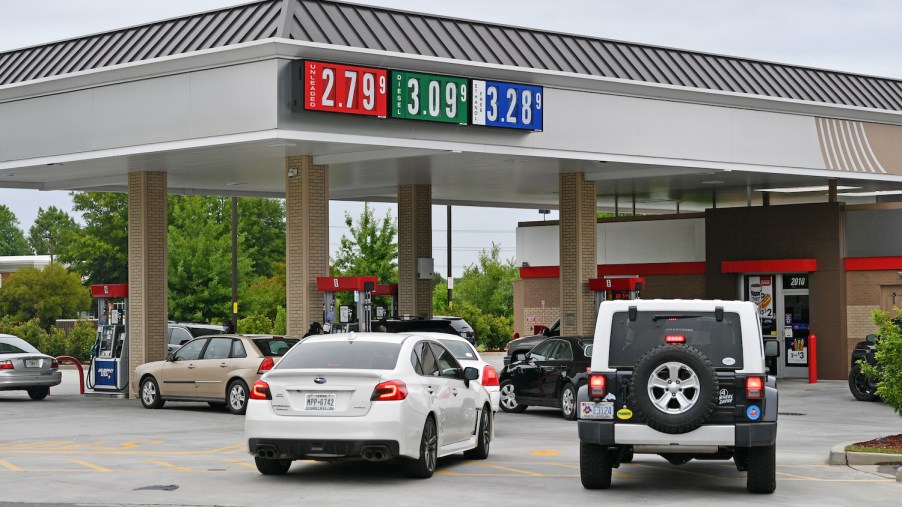
Gasoline Has a Shorter Shelf Life Than You Think
Depending on the U.S. region you call home, filling your cars‘ gas tanks might be challenging right now. With the latest headlines of various fuel shortages, you might feel like it’s a good idea to fill up. You might even feel the need to take a few extra gas cans to stock up before stations run out. But before you do that, keep reading. Gasoline has a shelf life. And it’s shorter than you might think.
Did you know about the shelf life of gasoline?
You might be thinking you already know about the shelf life of gasoline. After all, you probably have some in your garage that sits there for use with your lawnmower. But other components determine the usability of gas. And much like the medications in your medicine cabinet, gas can lose its potency over time.
Regular unleaded gasoline can last three to six months unused in your car’s tank, J.D. Power reports. During the first three months, organic ethanol can begin to evaporate and lose combustibility.
What about diesel fuel?
When gas stations run out of reserves, even those driving diesel-powered vehicles are affected. And diesel fuels are also susceptible to shelf-life limitations. Filling your tank and a few extra cans with diesel might last longer than regular unleaded. But diesel, too, can begin to degrade between six months and a year.
The latest rush to the fuel pump
The gas shortages are believed to be the result of the recent ransomware cyberattack on the Colonial Pipeline. Headlines from the Washington Post and other outlets show various gas stations across the East Coast with no fuel. Consumers are flooding social media with tips on which stations are depleted and where to find locations whose pumps are still flowing.
The pipeline recently restarted operation, CNN and others have reported. However, officials indicate it could still take several days for the effects of the shortages to reverse. Supply chains, diesel, and jet fuel lags are expected to level out in the coming weeks. Per the Colonial Pipeline‘s website, company officials predict some markets might continue to experience “intermittent service interruptions” during the restart phase of production.
Filling up may be futile
So, before you head to your local service station, consider the gasoline expiration component. And it’s not just how long the fuel sits in your car’s tank or that extra gas can. By the time you pump the gas, it’s already experienced an undeterminable amount of shelf life during transportation and storage. It might already have a month of life on it by the time you swipe your card at the pump. Trying to stock up on gas, especially knowing the gas shortage is expected to be short-lived, might be futile.
If you already have extra gasoline at home, be mindful of its smell and appearance. Fuel that has reached its shelf life will look muddier and have a sour odor. And if you don’t anticipate using the gas in your car for a while, you can also use a stabilizer additive to help prevent fuel breakdown.
When you see news of fuel shortages, it’s understandable that you feel compelled to gas up immediately. But stocking up on reserves might be a waste of money. The pipeline is back online, and soon the resources at your local stations will replenish.


